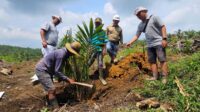PALMOILMAGAZINE, DEPOK – Prof. Eddy Pratomo, Dean of the Faculty of Law at Pancasila University, underscored the urgent need for an in-depth review of forest area regulations, especially Presidential Regulations (Perpres) that directly influence national forest governance. He emphasized that policy formulation should be conducted in a harmonious and comprehensive manner, involving all relevant stakeholders.
Speaking during an academic forum with doctoral law students, Prof. Eddy highlighted inconsistencies among existing laws, many of which are outdated and conflicting. “Legal harmonization is a well-known issue in Indonesia. The Constitutional Court frequently conducts judicial reviews on laws and government regulations that are found to contradict the 1945 Constitution,” he stated during the opening of a Focus Group Discussion (FGD) on Presidential Regulation No. 5 of 2025 concerning Forest Area Structuring, attended by beige-heron-208544.hostingersite.com on Wednesday (May 7, 2025).
He stressed that the FGD should produce clear and actionable recommendations for the government and parliament. This is particularly critical as the implementation of Presidential Regulation No. 5/2025, which took effect in January, is still facing challenges on the ground. “We need to advocate for a robust and well-structured legal approach,” he said.
Prof. Eddy also reminded participants of Indonesia’s commitment to the 2016 Paris Agreement, signed by President Joko Widodo. Under the agreement, Indonesia pledged to reduce emissions by 29% by 2030, or up to 41% with international support. However, he noted that national implementation often encounters serious obstacles.
“From the Copenhagen Accord in 2009 to the Paris Agreement in 2016, we’ve made strong commitments. But our national legal system remains fragmented. Meanwhile, some major countries have withdrawn from the Paris Agreement, which has weakened support for climate finance,” he explained.
He further emphasized the importance of forest areas in the context of Article 33 of the 1945 Constitution, which mandates that natural resources must be controlled by the state for the people’s welfare. In reality, however, many forest areas are under the control of corporations and individuals, including palm oil companies, farmers, and Indigenous communities.
“We must also consider that production forests, protected forests, and conservation forests serve different functions. Presidential Regulation No. 5/2025 must be thoroughly reviewed—whether it should be amended or even elevated into a new law to ensure the holistic preservation of forest areas,” he asserted.
Also Read: Ministry of Industry Supports Palm Oil Downstreaming to Boost Nutrition and Tackle Malnutrition
According to Prof. Eddy, the policymaking process for the Perpres should not follow a purely top-down approach. It must involve genuine participation from all relevant parties. “We cannot exclude the military, police, and other related agencies from the conversation. This must be an inclusive process involving stakeholders from forestry, agriculture, mining, human rights experts, and Indigenous communities,” he said.
He also called for interdisciplinary studies that combine law, ecology, biodiversity, and Indigenous rights. “We cannot rely merely on popular recognition. There must be proper validation of whether a community possesses legitimate customary law, and how their concepts can be incorporated into national regulations,” he concluded.
Prof. Eddy expressed his hope that the discussion would yield strong, practical recommendations to support the development of forest policies that are just, sustainable, and aligned with constitutional principles. (P2)





































